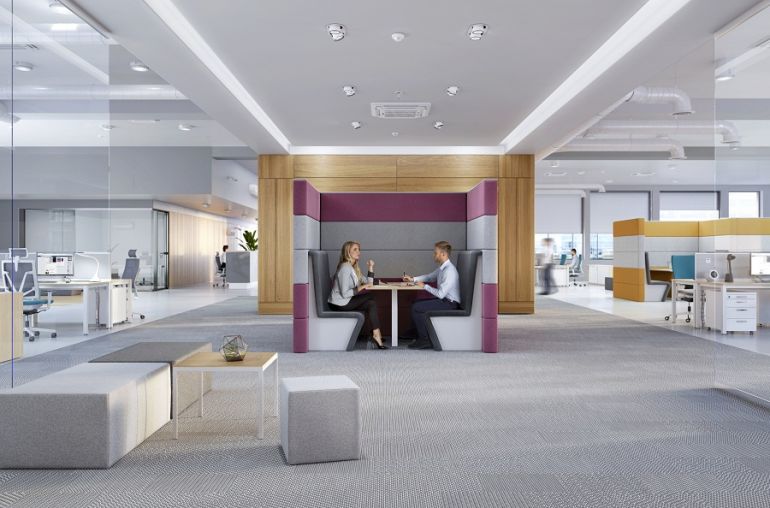Communication
An incredibly important factor is internal communication aimed at employees. As a rule, people are afraid of the unknown, thus it is worth resolving doubts at a very early stage. Systematic communication of subsequent stages of a given project and engagement of employees at the conceptual stage make that they consider themselves as the co-authors of the idea, which reduces their discomfort and stress related to the unknown.
Adaptation
Change management should not be associated with the day of commissioning. The first working days in new space are therefore of great importance. It is worth devoting several hours for organization of an office tour as well as workshops which make knowing the functionality of space and devising principles of work in a new place easier. An interesting idea is organization of an event in the office known as “housewarming party”, during which employees can know their new office space better after work hours in less casual atmosphere.
Office matters
At present, we can observe the growing awareness of how modern office space should look like. Therefore, more and more higher demands related to work place are placed on employers. It is not only about the sense of aestheticism as much more frequently the positive aspects of work in proper conditions are emphasized. Improvement of communication, opportunity of working in silence, better well-being, higher motivation and willingness to work – these are the effects of work in a well-designed office. The properly arranged space supports employees in the creation of new ideas and the implementation of tasks, thus it is worth thinking about an office as an investment.
People constitute the largest capital of every company and they work for the success of a given organization. A friendly and well-designed office, in which needs of its employees are placed first, can be a competitive advantage and it can have a good impact on effective functioning of the entire organization.
|
OFFICE USER EXPERIENCE Marta Badura, Consultant for Research and Office Space Development, Nowy Styl Group: While thinking about an office as a work place we cannot forget about people who carry out certain business processes. It is very difficult to design a functional office if we do not know the perspectives of its future users – their work styles, tasks as well as needs related to them. Even a visually beautiful space is not popular and fully used by employees when it disturbs their every-day work. A great difficulty in finding a new work place, that is a room for conducting a meeting, a place for a descret telephone call or a calm analysis of documents, makes that people more and more frequently search for a possibility of work outside their office. In spite of the fact that Polish employers are still afraid of the so called remote work, it becomes an increasingly desirable form of work and it is perceived by many people as a great advantage. This tendency does not favor employers because it makes both information flow and team cooperation more difficult. Therefore, the issue of the so called user centered design is more and more frequently discussed in the office context. The aware employers listen to their employees while creating new work space as the ones who know the best what is needed for the performance of their every-day duties. It helps to know the way of functioning of given work teams and departments as well as to create space where employees eagerly spend their free time because it supports their work. In this context, the issue of the so called user experience is very often mentioned these days. This concept, which is closely related to the design world of products and services in the Internet, also concerns offices. While designing a work place we need to remember about its future users. An office where it is easy to find ourselves in spite of a large area which helps and does not disturb and which provides proper equipment of the zone makes that every-day experiences of its users are positive. Thus, it has a good impact on their both engagement and productivity. |
- 1
- 2


